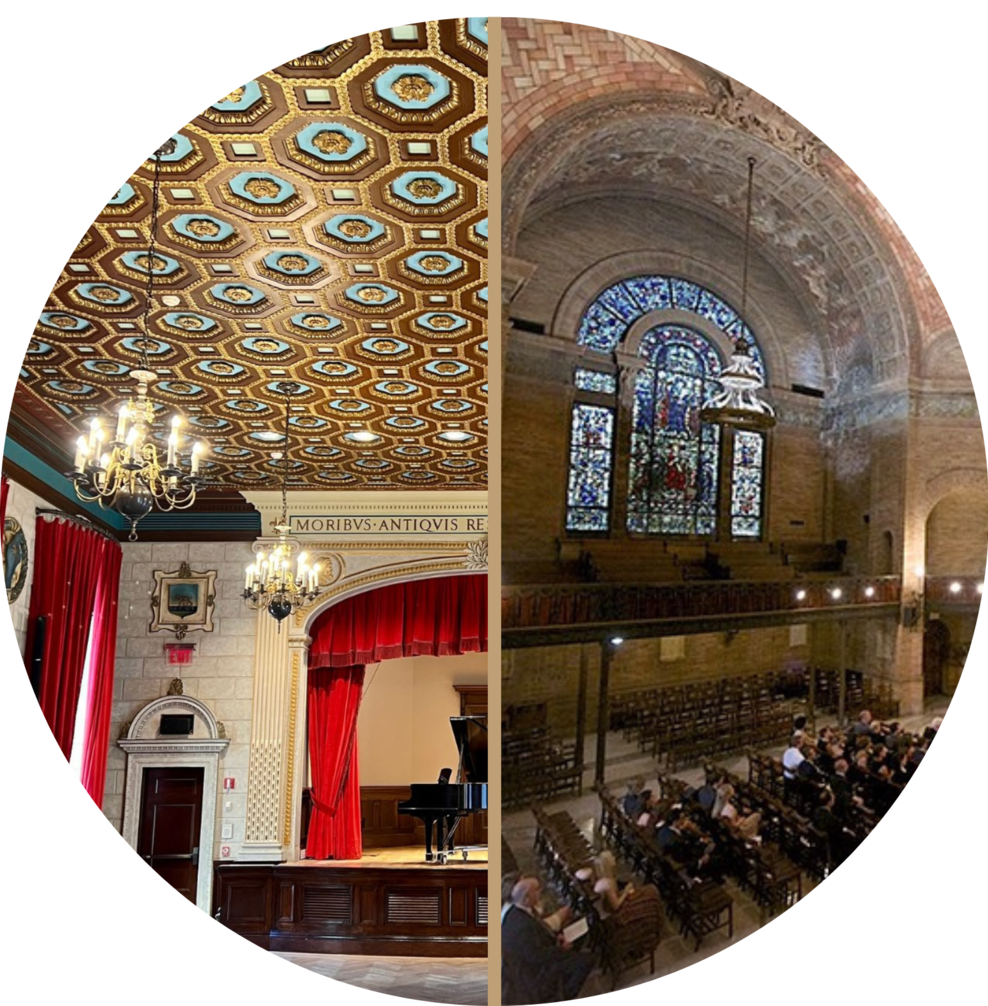Two locations for a two-part concert:
Part 1 Italian Academy for Advanced Studies · 1161 Amsterdam Avenue
Part 2 St. Paul’s Chapel · 1160 Amsterdam Avenue
See videos below.
The acclaimed vocal ensemble Cut Circle will start the evening with 16th-century secular songs in the Italian Academy’s Teatro. Then, during the intermission, the audience and performers will cross Amsterdam Avenue to Columbia University’s St. Paul’s Chapel, where Josquin’s sacred works will complete the program. Both venues boast of excellent acoustics for a cappella music and both were recently restored.
The ensemble is led by Stanford professor Jesse Rodin, director of the Josquin Research Project.
About the ensemble:
Cut Circle, the “masterful,” “driving,” “passionate,” and “pathbreaking” vocal ensemble that marries cutting-edge research with deep knowledge of and commitment to the music’s twists and turns, has a distinctly forward-looking approach to performance of Renaissance music. It is rooted in a flexible vocal technique, a tireless pursuit of technical perfection, and a belief that polyphony engages all the emotions, from the serious to the silly to the crushingly sad.
Founded in 2003 by Jesse Rodin (Director), Cut Circle specializes in music of the long fifteenth century—Guillaume Du Fay, Johannes Okeghem, Josquin des Prez, and their contemporaries. The ensemble is the recipient of the Noah Greenberg Award, which recognizes outstanding contributions to historical performing practices (American Musicological Society); the Prix Olivier Messiaen (France); Editor’s Choice (Gramophone, UK); and a Diapason d’Or (France).
Recent albums include a disc of anonymous masses and a double album devoted to the complete songs of Okeghem. A forthcoming album introduces a new sound for the music of Josquin. Cut Circle records for the Belgian label Musique en Wallonie. Their recording of sacred music composed for the Sistine Chapel by Josquin and others in the fifteenth century is available on Spotify here.
The “Cut Circle” is a symbol that, in the fifteenth century, functioned as both a time signature (the “O” indicates triple meter) and a tempo marking (the “|” calls for an accelerated tempo).
About the composer:
Josquin Lebloitte dit des Prez (c. 1450/55–1521), known as Josquin des Prez, or Josquin, was a composer of the High Renaissance who is variously described as French or Franco-Flemish. He was a central figure of the Franco-Flemish School and had a profound influence on the music of 16th-century Europe. Building on the work of his predecessors Guillaume Du Fay and Johannes Ockeghem, he developed a complex style of expressive—and often imitative—movement between independent voices that informs much of his work. He further emphasized the relationship between text and music, and departed from the early Renaissance tendency towards lengthy melismatic lines on a single syllable, preferring to use shorter, repeated motifs between voices. Josquin was a singer, and his compositions are mainly vocal. They include masses, motets, and secular songs.
Josquin’s biography has been continually revised by modern scholarship, and remains highly uncertain. Little is known of his early years; he was born in the French-speaking area of Flanders, and he may have been an altar boy educated at the Cambrai Cathedral, or taught by Ockeghem. By 1477 he was in the choir of René of Anjou and then probably served under Louis XI of France. Now a wealthy man, in the 1480s Josquin traveled Italy with Cardinal Ascanio Sforza, may have worked in Vienna for the Hungarian king Matthias Corvinus, and wrote the motet Ave Maria ... Virgo serena, and the popular songs Adieu mes amours and Que vous ma dame. He served Pope Innocent VIII and Pope Alexander VI in Rome, Louis XII in France, and Ercole I d’Este in Ferrara. Many of his works were published by Ottaviano Petrucci in the early 16th century, including the Missa Hercules Dux Ferrariae. In his final years in Condé, Josquin produced some of his most admired works, including the masses Missa de Beata Virgine and Missa Pange lingua; the motets Benedicta es, Inviolata, Pater noster—Ave Maria and Praeter rerum seriem; and the songs Mille regretz, Nimphes, nappés and Plus nulz regretz.
Influential both during and after his lifetime, Josquin has been described as the first Western composer to retain posthumous fame. His music was widely performed and imitated in 16th-century Europe, and was highly praised by Martin Luther and the music theorists Heinrich Glarean and Gioseffo Zarlino. In the Baroque era, Josquin’s reputation became overshadowed by the Italian composer Giovanni Pierluigi da Palestrina, though he was still studied by some theorists and music historians. During the 20th-century early music revival, publications and an academic conference caused his reevaluation as a central figure in Renaissance music. He continues to draw interest in the 21st century and his music is frequently recorded, central in the repertoire of early music vocal ensembles, and the subject of continuing scholarship. He continues to be celebrated worldwide following the 500th year since his death in 2021.
Co-Sponsor: Sacred Music at Columbia
